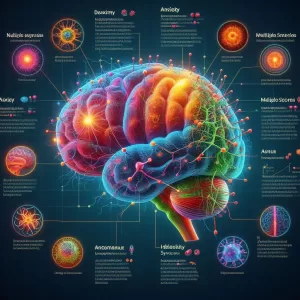What is Multiple Sclerosis?
Multiple sclerosis (commonly called MS) is a neurological disease, in which there is slow, progressive nerve damage. The cause of this nerve damage is unknown but may be related to an overactive immune system. This condition is more common in women than men, and most people are diagnosed between the ages of 15 and 60. Because all of the nerves in the body can be affected, the symptoms of MS also vary from person to person. The most common symptoms are vision problems, strange sensations in the arms and legs, and muscle weakness. MS is diagnosed by a specialist neurologist and by having magnetic resonance imaging (MRI) scans. The symptoms of MS can be relapsing (symptoms come and go, with symptom-free periods), or can progressively worsen without improvement. There are treatments that can help with the symptoms and slow down the progression of the nerve damage, but no treatments that can cure MS.
Risks
Women are affected more often and, on average, at a younger age than men. Most people are diagnosed between the ages of 15 and 60, although this condition can affect people of any age. People with a family member with multiple sclerosis may be more likely to develop this condition. The cause of multiple sclerosis is unknown, but many specialists think that an overactive immune system, which attacks the body’s own nerve cells, might be part of the cause.
Symptoms
MS can affect any nerves in the body, so the symptoms can be very different from person to person. More common symptoms include a loss of vision, a loss of feeling in the arms or legs, weakness in the arms or legs, dizziness, and imbalance. Some people develop bowel and bladder problems. Additionally, a lot of people with MS find that they feel tired all the time. People with MS may experience cycles of relapse (in which their symptoms come and go, with symptom-free periods), or can progressively worsen without improvement. Warm weather or warm baths may make symptoms worse.
Diagnosis
This condition is diagnosed by a specialist neurologist based on the symptoms, the physical examination, and a magnetic resonance imaging (MRI) scan. Other tests might include testing individual nerve function, blood tests, and testing the cerebrospinal fluid, the fluid that surrounds the nerves, and the brain.
Treatment
Treatment mostly consists of weakening the immune system. There are many medications that can do this for people with MS. One of the most widely used medications is called interferon. These medications can help to reduce the severity of the episodes and prolong the period between attacks. However, there is currently no cure available for MS. Physical exercise and physiotherapy can be helpful to maintain strength and balance, and regain strength after an episode.
**What is Multiple Sclerosis?**
Multiple sclerosis (MS) is a chronic disease that affects the central nervous system (CNS), [[2]]. CNS includes the brain, spinal cord, and optic nerves. In MS, the immune system attacks the myelin sheath, which is the protective covering that surrounds nerve fibers [[1]]. This damage disrupts the communication between the brain and the rest of the body, leading to a wide range of symptoms [[3]].
**Symptoms of Multiple Sclerosis**
The symptoms of MS can vary greatly from person to person, depending on the location and severity of the damage to the CNS. Some common symptoms include [[1]]:
* Numbness or weakness in the limbs
* Tingling or electric-shock sensations
* Difficulty with coordination and balance
* Unsteady gait or inability to walk
* Fatigue
* Speech problems
* Vision problems
* Cognitive difficulties
* Bladder and bowel problems
**Risk Factors for Multiple Sclerosis**
The exact cause of MS is unknown, but several risk factors have been identified:
* **Genetics:** MS is more common in people with a family history of the disease
* **Age:** MS typically develops between the ages of 20 and 40
* **Race:** MS is more common in people of European descent
* **Sex:** Women are more likely to develop MS than men
* **Geography:** MS is more common in temperate climates
* **Certain infections:** Some viruses and bacteria have been linked to an increased risk of MS
**Diagnosis of Multiple Sclerosis**
Diagnosing MS can be challenging because the symptoms can mimic those of other conditions. A doctor will typically perform a physical exam and ask about the patient’s symptoms. They may also order tests such as:
* Magnetic resonance imaging (MRI) to look for lesions on the brain and spinal cord
* Spinal tap (lumbar puncture) to examine the cerebrospinal fluid
* Blood tests to rule out other conditions
**Treatment for Multiple Sclerosis**
There is no cure for MS, but treatments can help to manage the symptoms and slow the progression of the disease. Treatment options include:
* Medications to reduce inflammation and suppress the immune system
* Physical therapy to improve mobility and coordination
* Occupational therapy to help with daily activities
* Speech therapy to improve communication skills
* Cognitive rehabilitation to improve memory and thinking skills
**Living with Multiple Sclerosis**
Living with MS can be challenging, but there are things that people with MS can do to manage their symptoms and live fulfilling lives. These include:
* Getting regular exercise
* Eating a healthy diet
* Getting enough sleep
* Managing stress
* Avoiding smoking and alcohol
* Staying informed about the latest treatments and research
One comment
Leave a Reply
Popular Articles






Multiple Sclerosis is a condition of the central nervous system whereby the insulating covers of nerve cells in the brain and spinal cord are damaged. This damage disrupts the messages that the brain sends to the body and can cause a wide range of symptoms, including physical, mental, and emotional problems.